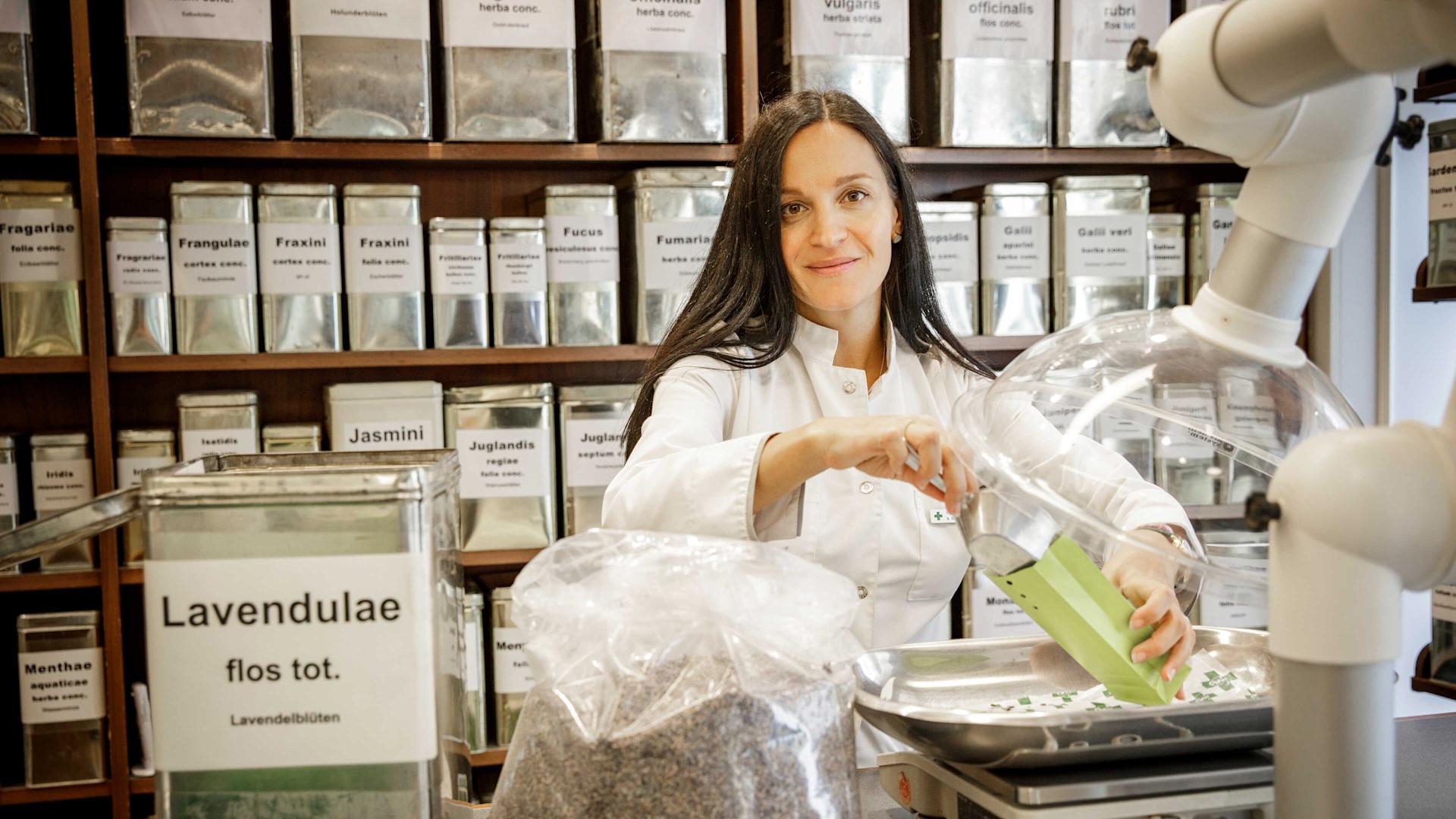
Interview
A Switzerland with high quality of life for everyone
In our interview, Mario Irminger outlines the Migros Group’s ambitions for its second century.
navigation

Medbase
How powerful are herbs? Which ones help with which complaints, and under what conditions are they dangerous? Herbal expert Nelly Richina explains.
For many complaints, yes! Medicinal herbs really are beneficial in many different ways. They not only help combat ailments such as colds, skin complaints and digestive disorders, but also support the treatment of serious illnesses and psychological suffering - sometimes as an all-in-one solution.
Lavender is a medicine cabinet all on its own. When ingested, its oil has an anxiolytic effect, as numerous studies have shown, providing effective relief from anxiety and restlessness. When applied to an insect bite, it eases the pain or itchiness.
The garden of my childhood had a major influence on me. My grandmother grew all kinds of herbs and vegetables and taught me from a very early age which plant was good for what. If I caught a cold, I'd drink elderflower syrup until it came out of my ears (laughs)!
Medicinal herbs often contain a wide range of valuable constituents that are particularly effective when combined. My father used devil’s claw to treat his gout. Its main active ingredient has an anti-inflammatory effect. The plant also stimulates the metabolism, thus helping to remove harmful substances from joints.
Certainly not all of them. As the name implies, the meadowsweet’s flowers are quite sweet and a bit like honey. They’re drunk as a tea and help with fever-like symptoms. Dandelion roots taste sweet too. However, bitter substances are generally beneficial.
Because they have an antibacterial and anti-inflammatory effect, such as bitter wormwood, which helps with gastrointestinal complaints. Plants containing bitter substances can also help with digestion and stimulate the liver and gall bladder.
Medicinal herbs can help tackle several complaints at once. Marshmallow root, for example, is used to treat irritation of the mucous membranes in the mouth and throat and the dry coughs that this causes. It can help to alleviate the side effects of chemotherapy too. Another benefit is the way in which they are administered: herbs in the form of teas or drops are a good alternative to tablets if you have difficulty swallowing, especially for the elderly. Plant-based products are often tolerated better too.
Medicinal herbs generally have fewer side effects than medicines containing synthetic chemical active ingredients. Their many constituents interact, ensuring a gentler impact on the body and balancing each other out. Herbal medicinal products must comply with the quality requirements of the Therapeutic Products Act.
No. They can also have undesirable side effects or even be poisonous. A habituation effect can also occur with some herbs. That’s why senna leaves shouldn’t be taken continually to treat constipation.
Generally speaking, yes. But I still see a great potential for their application in gynaecology and paediatrics. For instance, yarrow and lady’s mantle for menstrual cramps. Or hawthorn, which helps with temporary nervous heart complaints, such as palpitations, during menopause.
If children are restless, I’d recommend external application of lavender oil. Passionflower herb or California poppy also have a calming and sleep-inducing effect. Essential oils of angelica are great during the cold and flu season.
Caution is advised in some cases, for example if other medicines are being used as well. There’s also a risk of undesirable interactions with certain medicinal herbs. For example, people taking immuno-suppressants should steer clear of St John’s wort, despite its relaxing and mood-enhancing effects. Specialist practitioners can provide advice and suggest alternatives in such cases.
Healing and relief in a gentle and natural way, greater tolerance than with traditional medicines and a special flair for enhancing well-being. Many essential oils don’t actually need to be ingested at all. You can simply put a few drops on a cloth and inhale the vapours.
Aside from echinacea, use of taiga root is booming as a natural pick-me-up in cases of physical or mental exhaustion. After the school holidays, there’s also stronger demand for plants from holiday regions, such as lemony-tasting sumac. This is used as a table spice in the Arab world and helps with digestive problems.
Our range includes many in-house specialities, and we're constantly adding new formulations. We also develop new preparations in collaboration with doctors.
Definitely. Most plants are still largely unexplored. New findings are constantly being made, including about well-known medicinal plants. Lots of research reports indicate that milk thistle and silibinin are effective for type 2 diabetes. And that St John’s wort can help tackle Alzheimer’s disease.
Discover exciting stories about all aspects of Migros, our commitment and the people behind it. We also provide practical advice for everyday life.